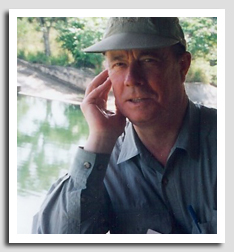 |
A.R. Homer has been fascinated with World War II all his life. A native of Birmingham, England, he grew up hearing stories of ration books and shortages, of the bomb that almost destroyed his parents' house, and of his father's service in the Royal Air Force. As a history major at Oxford University, he developed a serious interest in World War II. Later, he moved to Normandy, France, where he occasionally gave tours of the battlefields. He and his wife divide their time between New Jersey and Key West.
In 2006, Homer received the Distinguished Honor Award for “The Sobs of Autumn’s Violins” from the Military Writers Society of America (www.militarywriters.com).
Please contact him at: ARHomer@arhomer.com.
“Simply put, World War II was the greatest defining moment of recent history, a time when millions of ordinary men and women had to test their mettle in confrontation with a tyranny never before imagined and never after forgotten.
|
 |
“The Sobs of Autumn’s Violins” has a special meaning this year, as the 80th anniversary comes on June 6th.
This novel is built around the dramatic events and herculean efforts that launched the great invasion that began the demise of Nazism.
I focus on the everyday men and women of the United States, Britain and France – their hopes, their fears and their loves in a tale that weaves danger, espionage and mystery as they fight to keep the secret of D-Day safe and ensure its success.
The love stories are essential to “The Sobs of Autumn’s Violins” because they place the most human emotion amid the most dreadful human activity. Despite the ravages and uncertainties of war, people are thrown together and fall in love and, amid a present time of fear and despair, bring hope and belief for the future.
|
|
 |
“To Sow The Wind”. Beginning in 1933, as Europe begins its descent into war, To Sow the Wind deals with the different growing impact of Nazism on the two sons of a German aristocrat. Karl has strong misgivings, but his half-brother Reinhart embraces the odious creed, and uses his vicious anti-semitism and violence to bring an established Jewish family, the Bronsteins, to the brink of calamitous ruin.
In England, Louise Driver, who is studying German at Oxford University, is attracted to Karl, now a graduate student. Louise is caught in a dilemma between her radicalism and her studies.
She joins Karl in Germany, and throws herself into the battle against Nazism. As war approaches, she enjoys love, endures hatred, suffers brutal betrayal and performs staggering acts of courage.
And others, having sown the wind, will reap the whirlwind – in unexpected ways…
|
|
 |
In “Through the Dark Clouds Shining”, my novel based on World War I, I develop my story around not only the horror and devastation of the front-line battle, but also the social and political conflicts of a divided society on the home front.
The characters are involved in all aspects of the war: the disastrous results in Gallipoli; a conscientious objector’s refusal to fight; a woman’s battle in the suffragette movement; and a fight for survival as the Lusitania sinks.
And, amid the trauma of a front-line nurse’s emotional turmoil with a shell-shocked soldier, there is love, betrayal and compassion as a secret, long hidden by an aristocratic family, comes to light.
|
|
 |
“When Rome Falls”, is set in a period and place I find fascinating. From September, 1943 to June, 1944, Rome was occupied by Germany, Italy’s former ally. Mussolini had been ousted, Italy declared an armistice, the king fled, and Allied POWs flooded into the city to hide when their Italian guards walked off the job. During these nine months, the Vatican remained neutral, Italian fascists continued their collaboration with the Nazis, the Roman Jewish community endured a brutal roundup, and the Resistance fought the enemy with cunning and valor.
I spent many months researching this period. In Rome, I met the daughter-in-law of a heroine of the Resistance (the elevator scene in my novel is modeled after something that happened in her home) and in the Jewish ghetto I spoke to a survivor of the roundup who had lost his whole family. I also had a private tour of the Via Tasso Gestapo headquarters by the director of the Historic Museum of the Liberation of Rome and I visited Regina Coeli, where Jews and Resistance members were imprisoned, Fort Bravetta, where they were shot, and the Ardeatine Caves, where 335 innocent men and boys were murdered in reprisal for a an attack on a German column. All the while I kept thinking, “This is a story that must be told.”
|
|
 |
In “Look Long into the Abyss”, I try evoke the horrific chaos that reigned in the war’s last days when dedicated men and women travelled close behind the front lines to rescue looted art the Nazis had hidden in tunnels, mines, and castles. |
|
 |
“The Devil’s Alchemists” explores two aspects of the war – seemingly unrelated – that have always fascinated me: the failure of the Germans, who had both the raw materials and the expertise, to develop an atom bomb, and the rescue of virtually all of Denmark’s Jews. |
|
|
 |
And in my first book, “The Mirror of Diana”, I explore what it might have been like to have been a loyal German soldier who despised Nazism but was inescapably caught up in its ghastliness. |
|